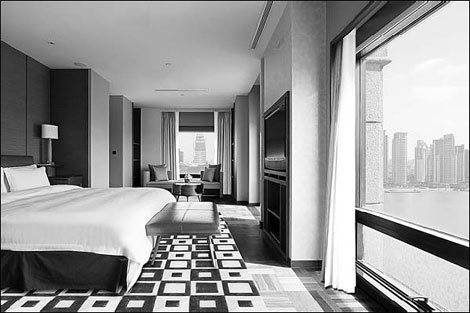Boutique hotels to enjoy more fame and popularity
|
A guest room at the Les Suites Orient Bund Shanghai. Provided to China Daily |
Which is the best hotel of the approximately 2,600 hotels in Shanghai?
It is not a luxurious heritage hotel on Shanghai's historic Bund, nor one in the city's financial district Lujiazui area.
According to the travel website Tripadvisor.com, it is Les Suites Orient Bund Shanghai, which opened in May 2010.
The boutique hotel near the Bund, which has received investments from China's largest port operator, Shanghai International Port (Group) Co Ltd and the US-based conglomerate Pen Holdings Inc, is managed by Les Suites Taipei. The New York Times and New York Magazine both ranked the hotel chain as the best in Taiwan.
Boutique hotels, which originated in the United States and the United Kingdom in the 1980s, are becoming more popular in China.
According to TravelDaily.cn, the number of boutique hotels that cooperate with Ctrip.com International Ltd, a popular travel agency in China, increased by 200 percent from 2008 to 2010.
Boutique hotels in China are mostly in large, affluent cities such as Shanghai, Beijing, Hangzhou and Nanjing.
At Les Suites Orient Bund Shanghai, the average occupancy in 2011 was 70 percent, while the average occupancy of five-star hotels in China was 63.85 percent.
"Although the number is lower than 2010 when the World Expo was held in Shanghai, it's still substantial. It shows the business has returned to normal levels and that we have well established ourselves among our target customers," said Joseph Pi, the hotel's chief operating officer.
Pi said boutique hotels will grow in popularity in cities throughout China.
"Business travelers are often under more pressure and have to work for longer hours during business trips. These unique boutique hotels can help to reduce the pressure on them," he said.
"In a remote tourist destination, it is safer to choose a large international hotel because it lowers the tourists' risk of uncertainty. But in big cities like Shanghai, I would recommend tourists try different interesting boutique hotels. In fact, in most cases, they can find very impressive ones."
A boutique hotel usually has no more than 100 rooms and is unique in design. Most have high-end facilities and pay close attention to customer service. Pi said that successful boutique hotels should have three elements.
"They should know very clearly who their target guests are and should not compromise even if business is not good enough," he said.
According to a report on Shanghai's boutique hotels conducted by auFOUND Marketing Consulting, a market research and consulting company, their target customers are affluent, well-educated, pursue innovative products and have high living standards.
"Those people are more willing to pay more money for personalized and exclusive products and service. They don't care too much about price," according to the report.
Pi said that the hotel's target customers are independent travelers. The hotel, which charges at least $218 a night, does not consider group travelers an important target.
"A group of people may make some noise when they stay together, which will affect the tranquility in our hotel," he said. "Also, we pay more attention to the balance of our customers. When other guests see a group of guests from a certain country gather, they may think of themselves as a minority. We don't want anybody to feel that way."
Being unique is another key to the success of boutique hotels.
Pi said that no matter what the hotel's theme is, whether it's historic, trendy or tailored to women, it should be distinct.
The interior of Les Suites Orient Bund Shanghai is elaborately designed, using wood, marble and brass, to create a cozy and homey atmosphere. With the Bund view and the Pudong skyline, the experience can be impressive.
"The style of our hotel is simple, yet elegant. I believe trends come and go, but class is forever," Pi said.
Pi said that a third requirement for a boutique hotel is personalized service.
"Hardware and design can be copied, but service can't," Pi said.
"For many guests, a stay at a hotel is like an adventure. So we promise to provide unique and unforgettable service without thinking too much about the cost."
He said that a guest recently wrote in her e-mail reservation that the trip to Shanghai was crucial to her family because she was trying to mend her relationship with her husband during the trip.
"Usually a hotel would upgrade their room to a suite and offer a free bottle of champagne. But we can do more than that," he said.
In the end, the hotel upgraded their room to the presidential suite and arranged a homemade Shanghai-style dinner in their room. The couple enjoyed the dinner over candlelight and romantic music chosen by the hotel. Pi said the add-ons were free of charge.
"The couple left the hotel happy. The lady gave me a hug and asked to take that CD (of romantic music) back home to keep that precious moment between them," he said.
Staff members at the hotel can make their own decisions to serve the guests better rather than asking for advice from a supervisor. For instance, if a guest checks in on a cold winter night, the receptionist will ask him if he needs a bowl of warm soup sent to his room. If the staff member notices that a guest has a cold, he will make a cup of ginger tea. Again, these additional services are offered for free, Pi said.
"Unlike the international hotel chains that have to stick to standardized procedures when serving the guests, we are more flexible to provide tailor-made service according to the needs of different guests," he said.
yangyijun@chinadaily.com.cn
(China Daily 03/17/2012 page10)



















